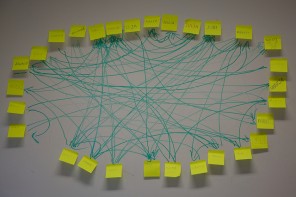By Molly Mann, 2015–2016 Connected Academics Proseminar Fellow
When you ask a roomful of humanities scholars what they think about networking, the tension is palpable. Sure, much of the work of our profession is contingent upon relationship building—it’s how we develop publishing contacts and find collaborators, and why we travel around the country on shoestring budgets to attend conferences—but there’s something about the word “networking,” with its connotations of boardrooms and power suits, that is both mysterious and repellent to us.
That, at least, was my observation during the October 2015 meeting of our Connected Academics proseminar at the New York Public Library (NYPL). After a panel of PhD-holding employees of the NYPL shared their stories with our group, heartening all of us with their message that research and satisfying academic work are possible outside the tenure track, a shift in discussion topic toward professional networking sent a hush over the room. As we dove into this discomfort as a group, probing it for its cause, we agreed that the networking relationship in business and professional spheres seems too transactional and transparent for our liking. Within the academy, building contacts is to all appearances transformative; you pursue someone because you’re interested in his or her ideas and work, and any professional boons stemming from that relationship appear to evolve naturally. Sure, the more formal campus-visit dinners and conference interviews are more outwardly transactional, but very rarely do we sidle up to someone at a cocktail hour because we hope that person will give us a job. (Note: don’t ever sidle up to someone and ask for a job!)
But perhaps the divide between transactional and transformative relationships isn’t so clear in any field. And since thinking outside the academy involves, well, thinking outside the academy, I will look at how the singer Amanda Palmer’s most recent book, The Art of Asking: How I Learned to Stop Worrying and Let People Help, breaks down this dichotomy, urging us all to be a little more comfortable with asking for what we need from others. I think academics trying to negotiate a changing professional landscape should take Palmer’s advice to heart, and I’ve certainly found in my own experience that being up front about my needs, giving someone else a clear opportunity to meet them, is the surest way to form a bond.
To offer one example: one of the NYPL employees on that panel was Elizabeth Denlinger, PhD, curator of the library’s Carl H. Pforzheimer Collection of Shelley and His Circle. I was intrigued by her work, because we share a background in library science, and I’m curious about the potential for meaningful work at the intersection of archival and literary studies, so I wrote Denlinger an e-mail thanking her for sharing her knowledge and experience with our group. The email—a simple “thank you”—didn’t require a response, but Denlinger wrote back warmly and enthusiastically, even including collection materials germane to my own research. We wrote back and forth a few times, learning that she’d briefly taught for my current institution and that we were both presenting at the same conference in a couple of weeks. I shared my need with Denlinger and she graciously met it, though all I had to offer in return was my sincere gratitude.
Sending that initial e-mail from a position of need, acknowledging that Denlinger had something (in this case, knowledge and experience) that I wished she would share with me, is the opposite of our normal academic stance of establishing our own expertise. I expected it to be daunting and uncomfortable, and I did not expect that Denlinger would so eagerly offer her guidance and support. Speaking to the potential discomfort of forging new relationships and leaning on the ones we have, Palmer situates power in this stance of need. She argues that becoming comfortable with asking for help and expressing gratitude changes our understanding of society: instead of being divided into two categories—productive versus burdensome—we all have the power to help each other. “Asking is,” she writes, “in itself, the fundamental building block of any relationship,” because both providing help and asking for it are gifts we give to one another, solidifying our bonds (2).
As academics, we work collaboratively on research to varying degrees, we peer-review journals, and we gather at conferences, but for the most part our professional networks are confined. Ours can be very lonely work, and the competitive nature of the field moves us to keep our struggles lonely, too, since we wouldn’t want to advertise our needs to someone else who might interpret them as weaknesses. But the problem of how to meaningfully employ PhDs doesn’t belong to job seekers alone but rather to the profession at large. Even tenured faculty members mentor doctoral students who will need jobs soon or are worried about what the field will look like once their own children come up through it. We all need to ask for help, we all need to offer it, and some of us are in better positions to offer a certain kind of help than others. Perhaps instead of attempting to “network,” we can simply be transparent about our needs, offer others our gratitude, and remain open to relationships that are transformative and, sometimes, transactional. In other words, perhaps we need to learn the art of asking.
Work Cited
Palmer, Amanda. The Art of Asking: How I Learned to Stop Worrying and Let People Help. New York: Grand Central, 2014. Print.
 Molly Mann is a doctoral candidate in English at St. John’s University, where she also serves as assistant dean for the Graduate Division of St. John’s College of Liberal Arts and Sciences and as an adjunct instructor for English 1100C: Literature in a Global Context. Molly holds a master’s of library science from St. John’s and a bachelor of arts in English literature with honors from Adelphi University. As a hybrid administrator-educator, Molly is passionate about creating alternatives to the traditional tenure track and about translating the valuable knowledge and skills developed within the academy to society at large. She is currently working to promote interdisciplinary education at the graduate level and looks forward to sharing and exploring ideas through the Connected Academics proseminar.
Molly Mann is a doctoral candidate in English at St. John’s University, where she also serves as assistant dean for the Graduate Division of St. John’s College of Liberal Arts and Sciences and as an adjunct instructor for English 1100C: Literature in a Global Context. Molly holds a master’s of library science from St. John’s and a bachelor of arts in English literature with honors from Adelphi University. As a hybrid administrator-educator, Molly is passionate about creating alternatives to the traditional tenure track and about translating the valuable knowledge and skills developed within the academy to society at large. She is currently working to promote interdisciplinary education at the graduate level and looks forward to sharing and exploring ideas through the Connected Academics proseminar.







